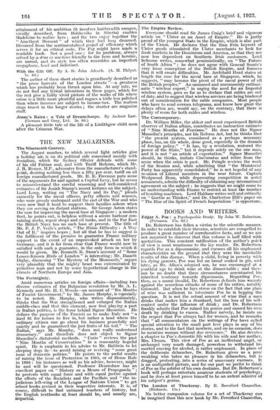The Fortnightly.
Amid numerous articles on foreign affairs—including two diverse estimates of the Bulgarian revolution by Mr. A. L. Kennedy and Mr. H. C. Woods—an account of Six Months of Fascist Government," by Mr. James Murphy, is especially to be noted. Mr. Murphy, who writes dispassionately, thinks that the War strengthened and enlarged the Italian middle-class and that this element, now first playing a part in Italian politics, is the force behind Signor Mussolini. He defines the purpose of the Fascisti as to make Italy not " a land fit for heroes to live in, but rather a land where the ordinary citizen can go about his business peacefully and quietly and be guaranteed the just fruits of his toil." " The Italian," says Mr. Murphy, does not really understand democracy, ' and therefore does not object to Signor Mussolini's dictatorial methods. " Curio " reviews the past " Nine Months of Conservatism " in a reasonably hopeful spirit. He is emphatic in his advice to Mr. Baldwin to let sleeping dogs lie—to avoid raising or reviving " some great issue of domestic politics." He points to the awful results of raising the issue of Protection in 1903, or of Home Rule in 1886: his instances as well as his advice, however, might be and will be questioned. Professor Hearnshaw has an excellent paper on " History as a Means of Propaganda " ; he protests with equal force and with equal justice against the. efforts of the Socialists and the Pacifists and " the in- judicious left-wing of the League of Nations Union " to get school books ,revised in their respective interests. It is, of course, difficult to find unbiased teachers of history, but the English textbooks at least should be, and usually are, impartial.


































 Previous page
Previous page